


The article highlights the essential skills required for clinical trial managers to excel in their roles. It identifies critical competencies such as:
These skills are not merely beneficial; they are crucial for the efficient oversight of clinical trials and for achieving successful research outcomes in a rapidly evolving medical landscape. Understanding and mastering these competencies is imperative for professionals aiming to thrive in the complex world of clinical research.
Navigating the intricate realm of clinical trials necessitates a distinctive skill set that can determine the success of a study. As the demand for innovative medical solutions surges, clinical trial managers are positioned at the forefront of this dynamic landscape. They are charged with ensuring compliance, managing budgets, and leading diverse teams. However, with as many as 86% of studies failing to meet enrollment targets, the pressure intensifies to not only meet but surpass expectations. What essential skills will empower these managers to excel in 2025 and beyond, transforming challenges into opportunities for pioneering research?
bioaccess® distinguishes itself in the research landscape by delivering exceptional agility in both approval and enrollment processes. With ethical approvals secured in an impressive 4-6 weeks, the organization empowers clinical trial managers to significantly reduce the time-to-market for innovative medical solutions. Furthermore, enrollment rates are accelerated by 50% compared to traditional markets, a critical advantage for Medtech, Biopharma, and Radiopharma companies eager to tap into diverse patient populations across Latin America, the Balkans, and Australia. This rapid pace is underscored by the alarming statistic that up to 86% of studies fail to meet their enrollment targets, making bioaccess®'s efficiency an invaluable asset in overcoming prevalent industry challenges.
Colombia's healthcare system, ranked among the top five worldwide, provides a robust foundation for medical studies, boasting a population exceeding 50 million and 95% coverage under universal healthcare, ensuring a rich pool for patient recruitment. Additionally, the R&D tax incentives available in Colombia, including a 100% tax deduction for investments in science and technology, further enhance its appeal as a premier research destination.
Successful case studies, such as the collaboration with GlobalCare Clinical Trials, which achieved an impressive 95% retention rate in Colombia and a 50% reduction in recruitment time, bolster bioaccess®'s reputation as a leader among clinical trial managers in the management of research studies. As clinical study approval processes continue to evolve, bioaccess® remains at the forefront, ensuring that its clients can navigate these changes with confidence and agility.
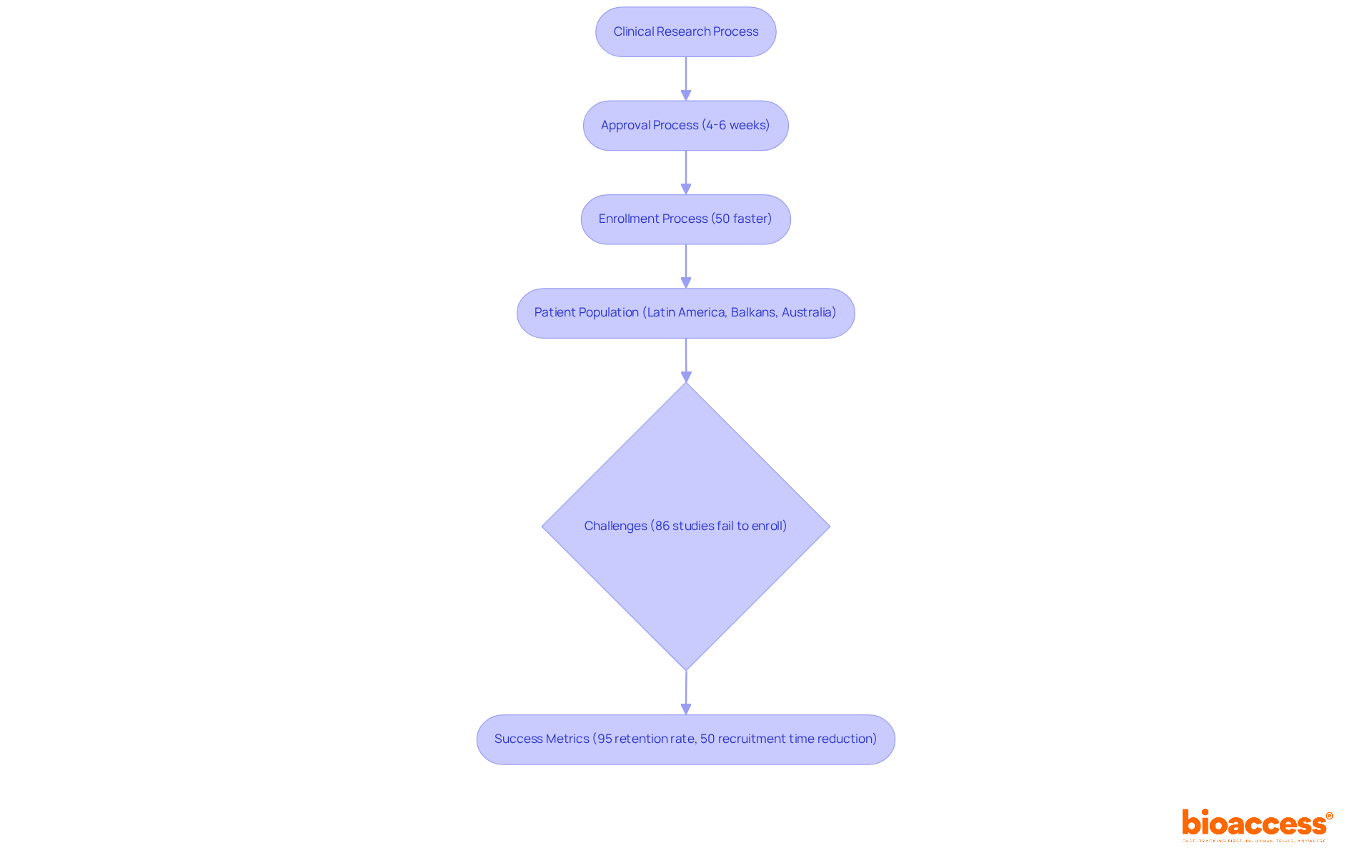
Clinical study coordinators must possess a comprehensive understanding of the regulatory environment, encompassing both local and international guidelines. This expertise is vital for ensuring that every aspect of the proceedings adheres to legal and ethical standards. Familiarity with regulations such as Good Clinical Practice (GCP) and the Declaration of Helsinki empowers leaders to navigate complex compliance challenges, thereby safeguarding the integrity of research and protecting patient rights.
Recent trends underscore the critical nature of GCP adherence, with compliance rates for interventional studies reported at over 92%, while observational studies lag at approximately 79.5%. This disparity highlights the necessity for ongoing training and awareness among study personnel to enhance compliance and clarity of informed consent forms (ICFs).
Moreover, as the medical research landscape evolves, supervisors must stay attuned to new regulations and ethical considerations, ensuring that participant rights are prioritized throughout the study process. By fostering a culture of adherence and ethical behavior, clinical study supervisors can significantly contribute to the advancement of medical research and the development of new treatments.
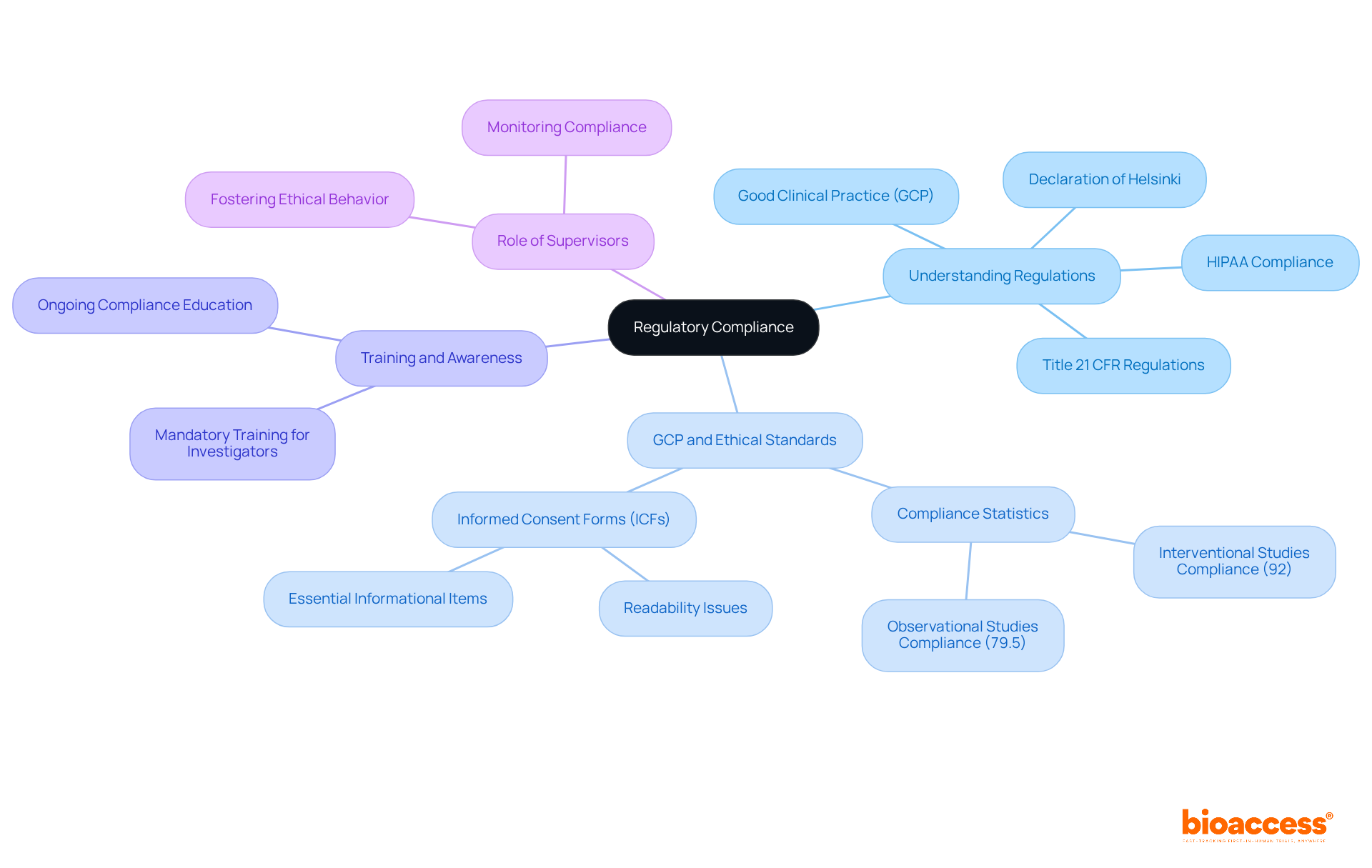
Clinical trial managers are pivotal in project oversight, ensuring that studies are executed effectively and within budget constraints. This responsibility necessitates the development of comprehensive project plans by clinical trial managers, the establishment of clear milestones, and diligent monitoring of progress against timelines. By utilizing effective project methodologies, such as Agile or Waterfall, operational efficiency is significantly improved, fostering communication among team members.
For example, Agile methodologies have been demonstrated to enhance project success rates by 28% compared to traditional approaches. Furthermore, the average duration for Phase 1 and Phase 2 studies is approximately 2.7 and 3.2 years, respectively, underscoring the critical need for meticulous planning and execution.
Employing advanced project management tools, such as Jira—preferred by nearly 42% of clinical trial managers—can refine processes and enhance collaboration, ultimately leading to successful outcomes. Partnering with bioaccess® can expedite patient enrollment by 50% and save $25K per patient by providing FDA-ready data, effectively addressing common recruitment challenges faced by Medtech and biopharma startups.
bioaccess® specializes in overseeing Early-Feasibility Studies, First-In-Human Studies, and other essential research initiatives, making it imperative for clinical trial managers to continually assess and adapt their strategies according to team needs and project demands to optimize efficiency and effectiveness.
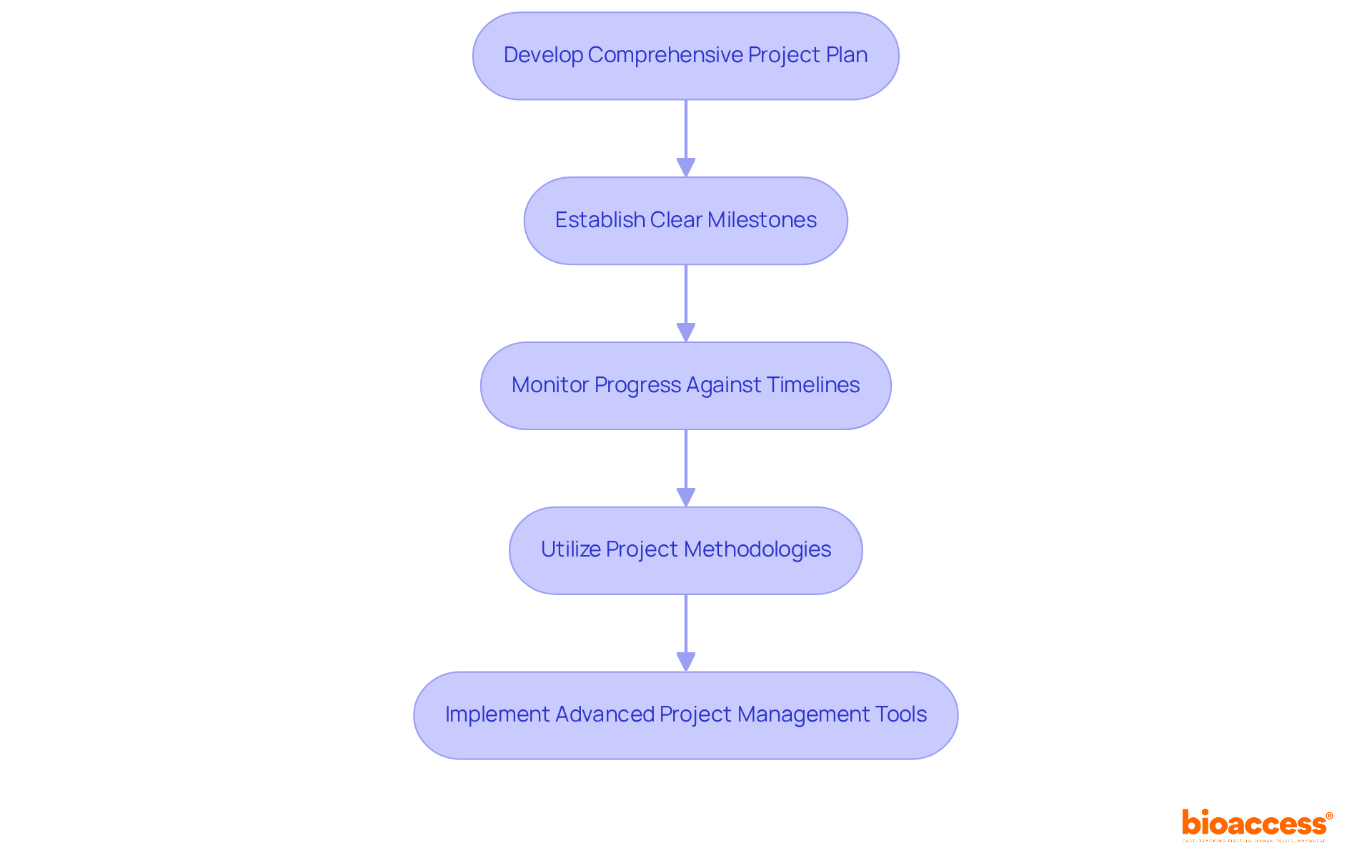
An effective research project manager embodies strong leadership qualities that inspire and motivate their team. Cultivating a collaborative environment is essential, where team members feel valued and empowered to share their insights. Regular team meetings and open communication channels foster transparency and trust, which are vital for project success. Acknowledging personal efforts not only improves team interactions but also propels shared achievements in research studies.
The partnership between bioaccess™ and Caribbean Health Group illustrates how clinical trial managers enhance research project oversight services, which include:
By emphasizing teamwork, clinical study coordinators can significantly enhance results, minimize mistakes, and increase overall productivity, ultimately resulting in more successful study outcomes.
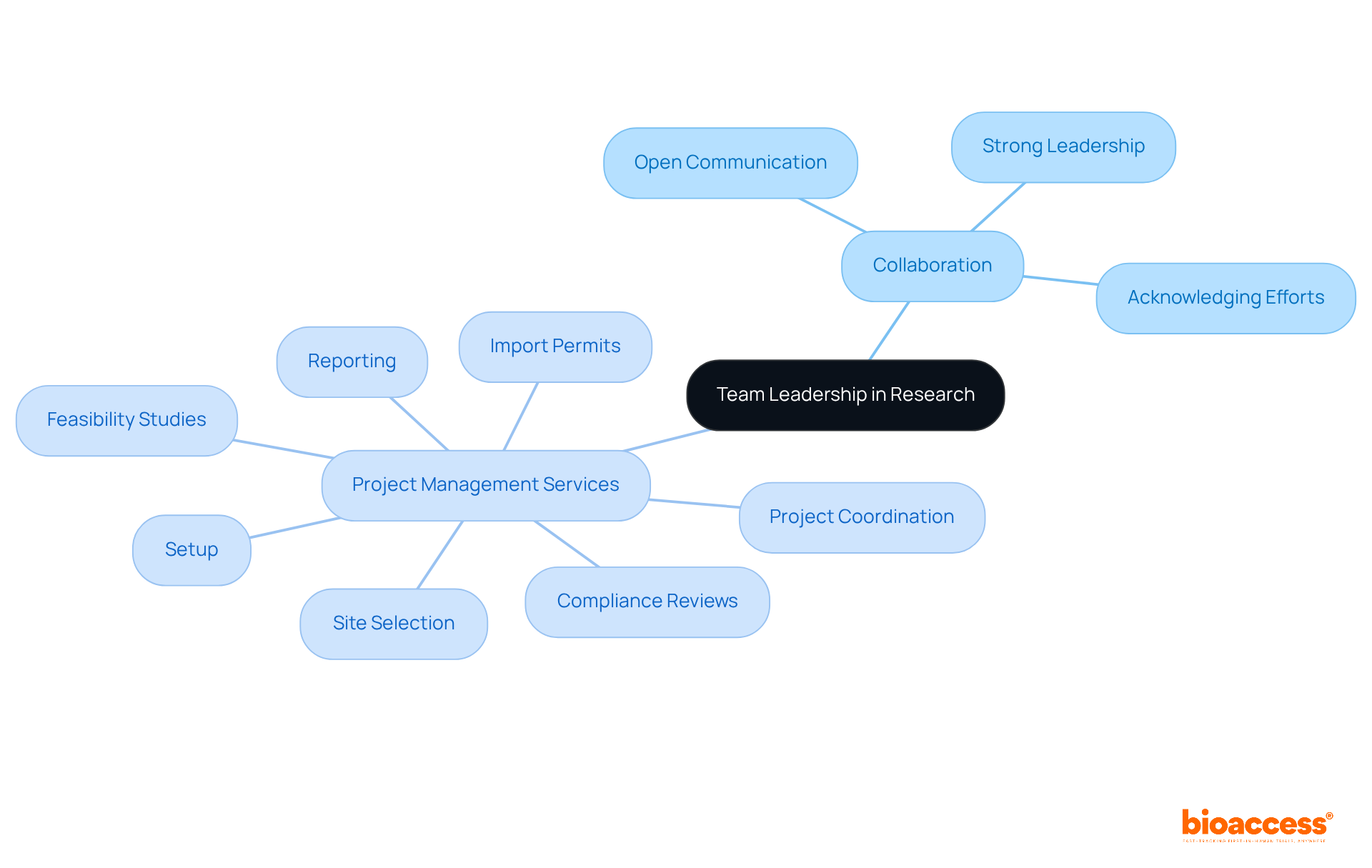
Clinical study supervisors must prioritize robust data handling practices to uphold the accuracy and integrity of study data. Establishing clear protocols for data collection, storage, and analysis is essential. The implementation of electronic data capture (EDC) systems not only simplifies data handling processes but also significantly reduces the likelihood of errors, thereby enhancing the reliability of study outcomes.
Studies employing integrated, automated data handling workflows finalize patient enrollment 30% faster and achieve database lock in 45% less time compared to those using fragmented systems. Notably, bioaccess® enables treatment-naive cardiology or neurology cohorts to be enrolled 50% quicker than Western sites, resulting in $25K savings per patient with FDA-ready data.
Furthermore, pharmaceutical firms that adopt comprehensive data handling solutions increase their chances of regulatory approval by 23%, while those utilizing strong research data systems reduce their research costs by an average of 25%. Preserving data integrity is crucial, as it directly impacts regulatory approval timelines and the overall success of research studies.
By ensuring high-quality information through effective oversight techniques, research coordinators can promote more efficient studies and contribute to the advancement of medical innovations. To amplify these benefits, consider integrating thorough research study coordination services that encompass feasibility assessments, site selection, compliance evaluations, and project oversight.
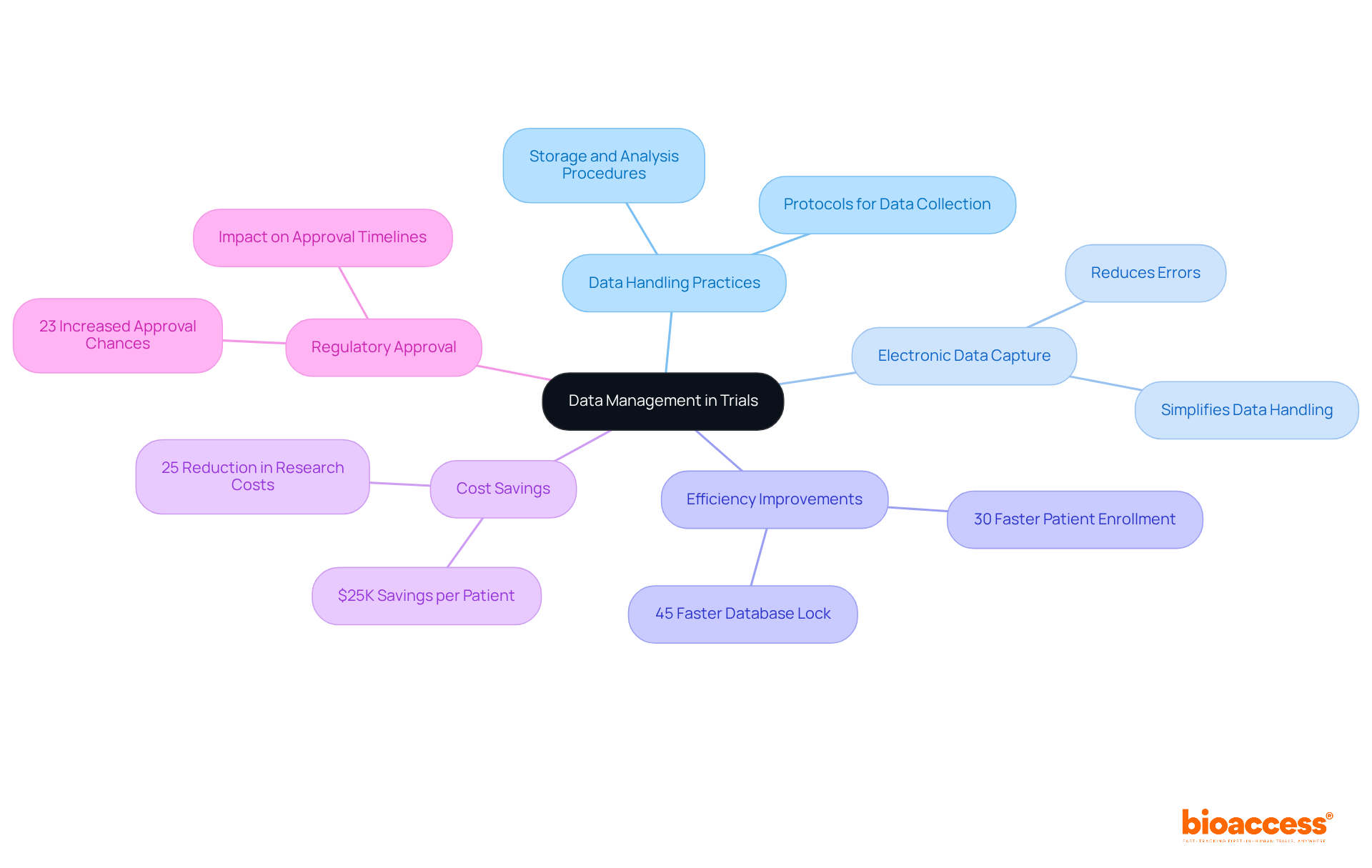
Effective communication stands as a cornerstone for study managers, who must adeptly convey information to a diverse array of stakeholders, including sponsors, regulatory organizations, and team members. This task demands not only the ability to articulate complex scientific concepts in a comprehensible manner but also a steadfast commitment to active listening and responsiveness to feedback.
At bioaccess, our comprehensive clinical study management services—including feasibility studies, site selection, compliance reviews, study setup, import permits, project management, and reporting—are meticulously designed to enhance this communication process. By employing organized approaches and providing consistent updates, we foster trust and stimulate collaboration among all parties involved.
Studies indicate that clear communication significantly elevates stakeholder satisfaction, reducing misunderstandings and aligning expectations. Furthermore, effective communication can lead to improved outcomes, ensuring that all stakeholders remain informed and engaged throughout the process. In an environment where clarity is paramount, refining communication skills is imperative.
Notably, 80% of the assessed non-technical skills (NTS) construct was communication, underscoring its critical role in research. Additionally, communication issues within teams are responsible for up to 80% of medical errors in healthcare settings, illustrating the severe repercussions of inadequate communication.
To further enhance communication effectiveness, research managers should implement regular feedback systems, ensuring that every voice is recognized and addressed. With specialists such as Juan Cuya, MD, and Oswaldo Amaya, MD, steering our initiatives, bioaccess is unwaveringly committed to fostering effective communication throughout the clinical research process.
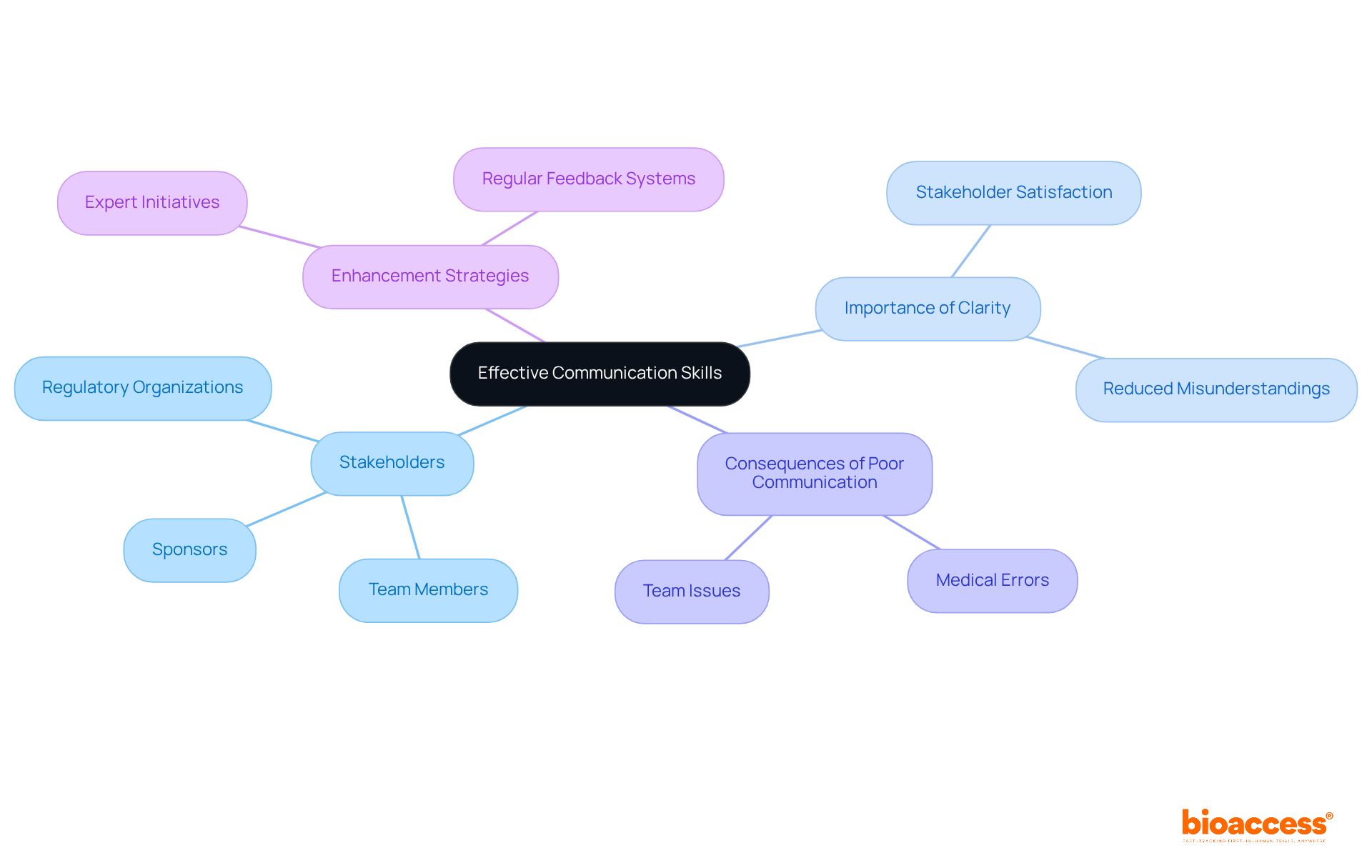
Clinical studies frequently face unforeseen obstacles that necessitate innovative solutions. Effective clinical trial managers excel in the early identification of potential issues and in formulating strategic responses. This process may involve:
A proactive approach to addressing issues not only mitigates risks but also significantly enhances the success rates for clinical trial managers in medical studies. Research indicates that approximately 80% of medical studies are postponed or terminated due to recruitment challenges, leading to potential costs ranging from $600,000 to $8 million each day. This reality underscores the imperative for clinical trial managers to develop effective strategies to tackle these challenges.
In this context, the partnership between bioaccess™ and Caribbean Health Group is pivotal, aiming to position Barranquilla as a premier destination for research studies in Latin America, with the support of Colombia's Minister of Health, Juan Pablo Uribe. By leveraging bioaccess®'s innovative strategies, including their 6-8 week sprint for expedited regulatory approval and patient enrollment, clinical trial managers can achieve over 50% faster patient recruitment and notable cost savings of $25K per patient. Furthermore, specific methodologies employed by bioaccess™ to foster innovation and flexibility empower clinical trial managers to effectively navigate challenges, ensuring that studies meet their enrollment targets and timelines. The adoption of decentralized research models can facilitate quicker participant recruitment and enhance diversity within study populations, as 70% of potential participants live more than two hours from research centers. This ultimately contributes to more robust and successful outcomes.

Effective budgeting and financial oversight are indispensable for clinical trial managers, ensuring that trials remain within their designated budgets. This necessitates the creation of comprehensive financial plans that meticulously outline all anticipated costs, encompassing personnel, patient care, and regulatory compliance. Regular monitoring of expenditures is crucial for clinical trial managers; it enables them to pinpoint cost-saving opportunities and adjust budgets as needed.
Moreover, leveraging financial control software can significantly streamline this process by automating expense tracking and delivering real-time forecasts of future costs. Such tools not only optimize resource allocation but also support adherence to industry standards, ultimately leading to more successful testing outcomes.
By adopting best practices in financial management, research coordinators can mitigate risks associated with budget overruns and ensure the effective utilization of resources throughout the study lifecycle.
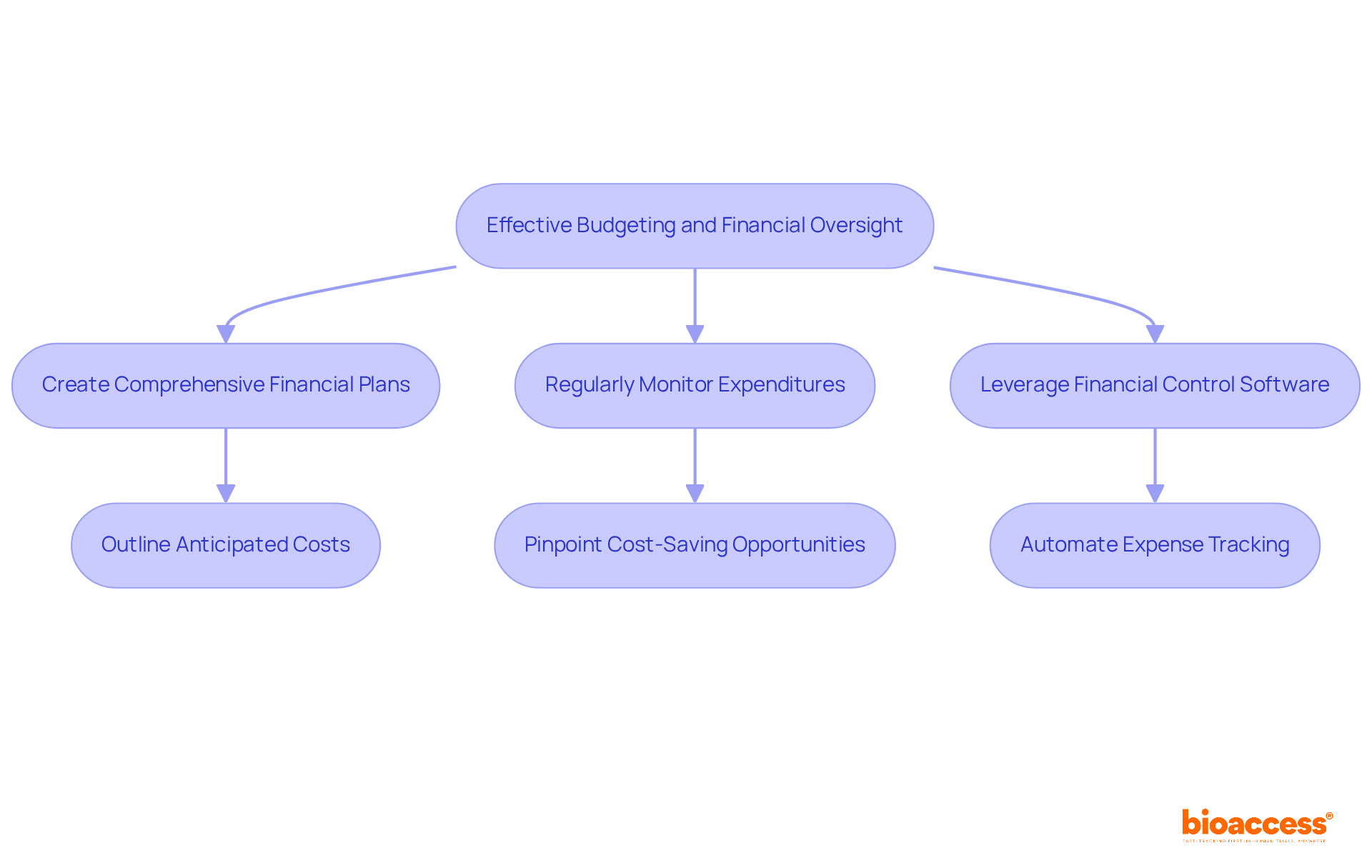
Clinical trial managers play a pivotal role in developing effective protocols that delineate clear objectives, methodologies, and endpoints. This process necessitates collaboration with clinical researchers, statisticians, and regulatory experts to ensure compliance with scientific and regulatory standards. A well-organized protocol serves as a roadmap for the study, enhancing its credibility and acceptance by regulatory bodies. Adherence to Good Clinical Practice (GCP) guidelines and local regulatory requirements is essential for maintaining the integrity of the study.
Current trends indicate that the increasing complexity of medical studies necessitates a more strategic approach to protocol creation by clinical trial managers. Effective protocols are crucial for mitigating risks and boosting the likelihood of regulatory approval, ultimately leading to successful outcomes. Notably, bioaccess® offers accelerated regulatory approvals in just 6-8 weeks, significantly faster than the typical 6-12 months observed in the US and EU. This efficiency, coupled with the ability to enroll treatment-naive cardiology or neurology groups 50% quicker than Western locations, positions bioaccess® as a leading Contract Research Organization facilitating medical device studies in Latin America.
The significance of these protocols cannot be overstated, as they are fundamental to the ethical practice of medical research and the advancement of medical innovations. Collaboration among stakeholders is essential, and clinical trial managers will leverage these protocols to navigate the evolving landscape of clinical research effectively.
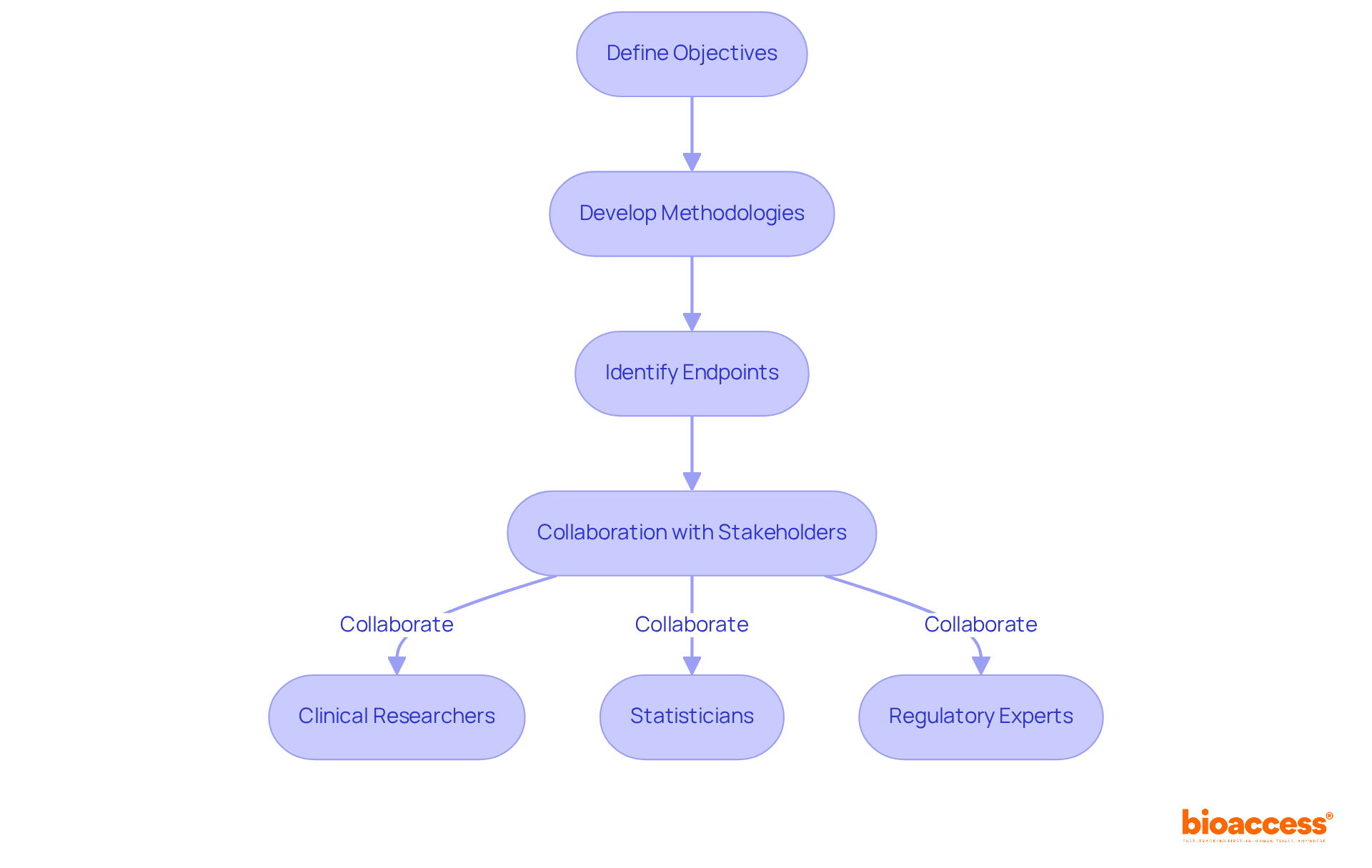
In the dynamic landscape of medical research, it is imperative for coordinators to cultivate flexibility to adeptly navigate obstacles. This entails not only revising timelines and reallocating resources but also adapting protocols in response to emerging data or unforeseen challenges.
Adaptive study designs, which allow for pre-planned modifications throughout the research process, have proven to enhance efficiency and safeguard participant welfare. For example, the I-SPY 2 Trial for breast cancer exemplifies how adaptive strategies can expedite the identification of effective treatments, ultimately leading to improved success rates.
By nurturing a flexible mindset and welcoming change, clinical trial managers can greatly enhance the resilience and overall success of their trials.
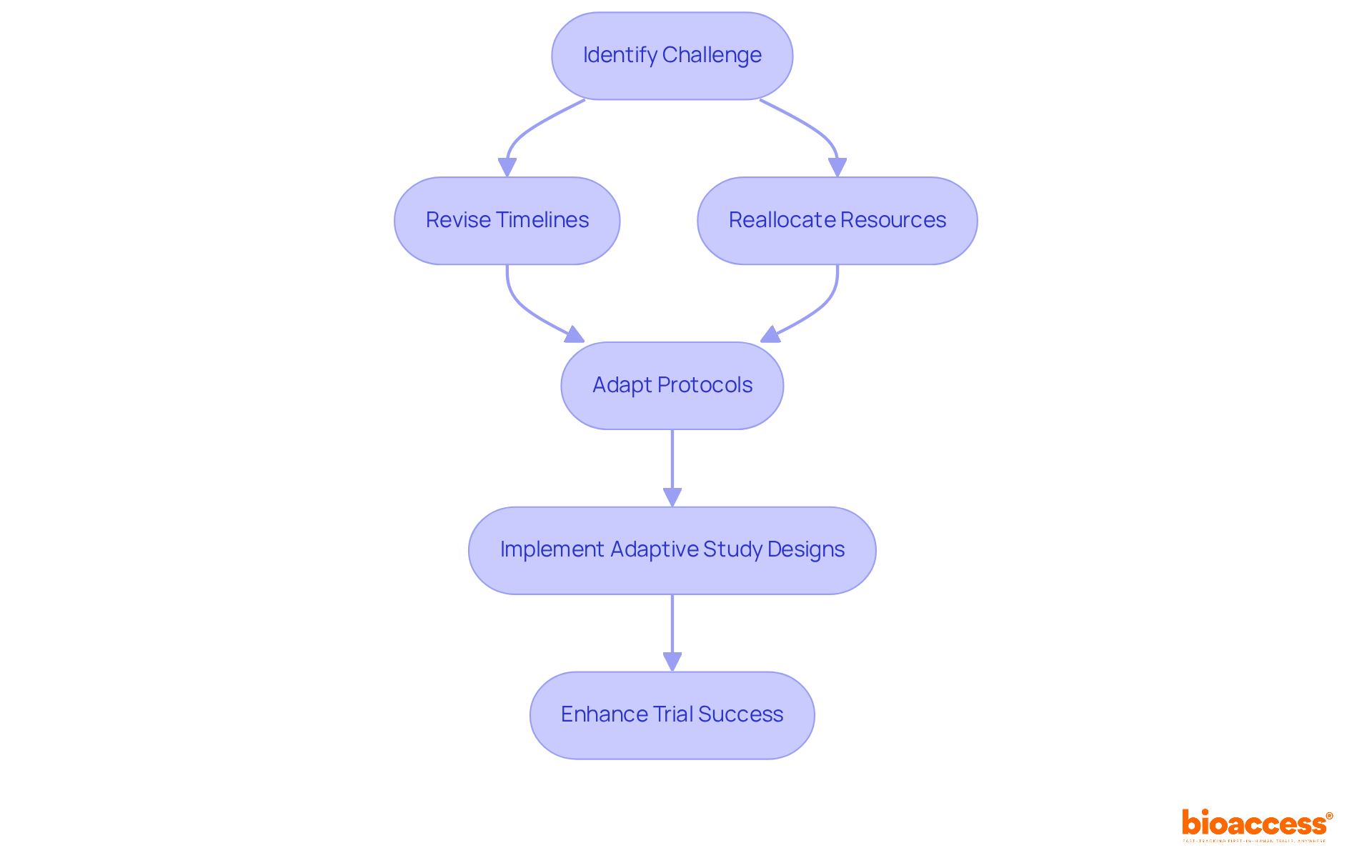
The success of clinical trial managers relies on a diverse array of essential skills that enable effective oversight and execution of research studies. Mastery of these competencies not only enhances the efficiency of clinical trials but also propels advancements in medical research. By embracing agility, regulatory compliance, project management, team leadership, and effective communication, clinical trial managers can significantly influence the outcomes of their studies and the broader healthcare landscape.
Key insights have been shared, underscoring the importance of:
Each of these elements is vital in ensuring that clinical trials are conducted ethically, efficiently, and successfully. Furthermore, collaboration with organizations like bioaccess® illustrates how innovative approaches can accelerate clinical research, ultimately improving patient outcomes.
In light of these insights, it is evident that clinical trial managers must continuously refine their skills and adopt best practices to navigate the complexities of the research environment. By fostering a culture of collaboration, embracing innovative problem-solving strategies, and committing to effective communication, these professionals can not only meet but exceed the challenges of clinical trial management. This proactive approach will enhance the success of individual studies and contribute to the advancement of medical science as a whole.
What is bioaccess® and what advantages does it offer in clinical research?
bioaccess® is an organization that provides exceptional agility in the approval and enrollment processes for clinical trials, securing ethical approvals in 4-6 weeks and accelerating enrollment rates by 50% compared to traditional markets.
How does bioaccess® help in overcoming enrollment challenges in clinical trials?
bioaccess® addresses the common issue of enrollment challenges, where up to 86% of studies fail to meet their targets, by significantly reducing the time-to-market for medical solutions and enhancing enrollment efficiency.
Why is Colombia considered a favorable location for clinical trials?
Colombia's healthcare system is ranked among the top five worldwide, with a population exceeding 50 million and 95% coverage under universal healthcare, providing a rich pool for patient recruitment. Additionally, R&D tax incentives, including a 100% tax deduction for investments in science and technology, make it an attractive research destination.
What are some successful outcomes associated with bioaccess®?
Successful collaborations, such as with GlobalCare Clinical Trials, have demonstrated a 95% retention rate in Colombia and a 50% reduction in recruitment time, showcasing bioaccess®'s effectiveness in managing research studies.
What is the importance of regulatory compliance in clinical studies?
Regulatory compliance ensures that clinical studies adhere to legal and ethical standards, safeguarding the integrity of research and protecting patient rights. Familiarity with regulations like Good Clinical Practice (GCP) is essential for clinical study coordinators.
What are the current compliance rates for clinical studies?
Compliance rates for interventional studies are reported at over 92%, while observational studies lag at approximately 79.5%, highlighting the need for ongoing training and awareness among study personnel.
How can clinical trial managers improve project management in studies?
Clinical trial managers can enhance project management by developing comprehensive project plans, establishing clear milestones, and utilizing methodologies like Agile or Waterfall to improve operational efficiency and team communication.
What is the impact of Agile methodologies on project success rates in clinical trials?
Agile methodologies have been shown to enhance project success rates by 28% compared to traditional approaches, making them a valuable tool for clinical trial managers.
What tools can clinical trial managers use to refine processes?
Advanced project management tools such as Jira, which is preferred by nearly 42% of clinical trial managers, can help refine processes and enhance collaboration among team members.
What types of studies does bioaccess® specialize in overseeing?
bioaccess® specializes in overseeing Early-Feasibility Studies, First-In-Human Studies, and other essential research initiatives, providing support to clinical trial managers in optimizing efficiency and effectiveness.